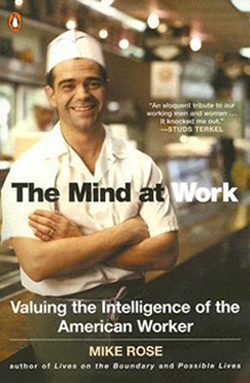Book Recommendation: The Mind at Work: Valuing the Intelligence of the American Worker
August 30, 2017

One might say that Mike Rose, a UCLA professor and Guggenheim Fellow, has come a long way from his family's blue-collar roots. Yet, Rose himself might instead point to the commonalities between his academic career and the work of his family. In his book, The Mind at Work, Rose challenges readers to confront their own biases and conceptions of blue-collar work. He offers a compelling exploration of how we can more critically think about physical labor, career and technical education (CTE), and the role that each of these occupies in our society.
Rose interrogates deeply-embedded cultural conceptions that elevate white-collar work above physical labor. Raised by his mother, a waitress, Rose maintains a fierce respect for blue-collar work. Through his research, he articulates the ways that workers like his mother rely on their cognitive skills—memory, perception, attention, and knowing—every day at their jobs.
Rose's visit to a high school wood construction class affirms his belief in the complex, intellectual nature of manual labor. He observes the numerous cognitive skills that Mr. Jerry Devries, an experienced cabinetmaker and teacher of 20 years, and his students use in their work. Students in the workshop learn through demonstrations and directed application. They also learn from each other. A student remarks, "You see work going on all around you. You see people making small, small mistakes, and you learn from that". From "spatializing" abstract mathematical concepts to recalling complex schematics and processes in constructing a product, carpentry is as mentally demanding as it is physically. Carrying out these tasks successfully is a learning process, and Mr. Devries's students are taking their first steps on this pathway to mastery.
But where does CTE finds its place within the broader educational system? In the past, many high schools placed students in distinct tracks, such as college preparatory, general education, or vocational. Placement was typically determined by IQ tests, prior records, and teacher recommendations, leaving the student with little agency. Students of color and working-class students were often disproportionately placed in career and technical education classes, regardless of their interest or aptitude for other subjects.
Rose explains that negative perceptions of CTE, in combination with prejudicial ideas concerning the ability and societal role of certain marginalized groups, have placed CTE in a precarious position. Rose argues that CTE courses are one path to a worthwhile, intellectually fulfilling career, and educators must ensure that students are given the knowledge and tools to make this choice for themselves.
The Mind at Work tackles important issues concerning the future of CTE and how we conceive of physical labor. Rose guides his audience through these questions with the hope that we can better serve the students who choose this path and more appropriately value their vital role in society.
